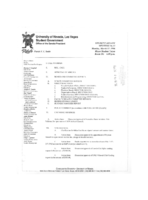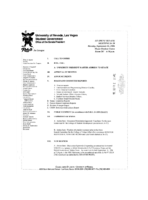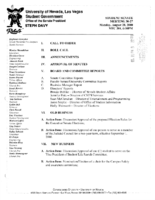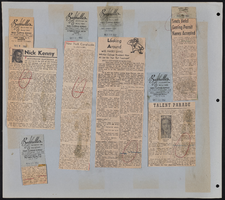Search the Special Collections and Archives Portal
Search Results
Lift Up Windsor Park Project Collection
Identifier
Abstract
The Lift Up Windsor Project Collection (approximately 2020-2023) contains digitized copies of North Las Vegas, Nevada City Council meeting minutes, geological and environmental impact statements, and other types of documentation originally published from the 1950s to 2010s that were collected by Sebastian Ross, graduate student at UNLV's Boyd School of Law and an archived version of the Lift up Windsor Park project website. Assemblywoman Dina Neal (now Nevada State Senator) led the project, which included faculty and students from UNLV's film department and law school, to research and advocate for Windsor Park, one of the first all-Black housing communities in North Las Vegas that was developed in the 1960s. The records in this collection represent the research material used for
Archival Collection
Art Wolf Professional Papers
Identifier
Abstract
The Art Wolf Professional Papers (1988-2018) document the career of museum professional and consultant Art Wolf who specialized in supporting cultural heritage of indigenous communities, particularly in the Southwest and Las Vegas, Nevada. Materials document Wolf's work with the American Alliance of Museums (AAM) as a board member, in conference planning, and as a Study Leader for Smithsonian Associates Study Tours. Also included are materials that represent Wolf's involvement as an alumni of the Leadership Las Vegas program and director of the Nevada State Museum. The collection includes some ephemera and invitations to different events held in Las Vegas, Nevada that Wolf was invited to. The collection also includes examples of unsuccessful bids for consultancy jobs through WOLF Consulting and his files as a master's thesis adviser for the Museum Studies program at Harvard Extension School.
Archival Collection

Meeting minutes for Consolidated Student Senate University of Nevada, Las Vegas, November 17, 1993
Date
Archival Collection
Description
Text
Minutes Temple Beth Sholom Board of Directors meetings, September 1952 - December 1956
Date
Archival Collection
Description
The meeting minutes of the board of directors of Temple Beth Sholom, then known as the Jewish Community Center of Las Vegas, Inc., include the proceedings of meetings held from 1952 to 1956. Also included are periodic reports from committees of the board such as Jewish education, cemetery, and building committees, and budget reports.
Text

Meeting minutes for Consolidated Student Senate University of Nevada, Las Vegas, March 11, 1996
Date
Archival Collection
Description
Text

Meeting minutes for Consolidated Student Senate University of Nevada, Las Vegas, September 16, 1996
Date
Archival Collection
Description
Text

Meeting minutes for Consolidated Student Senate, University of Nevada, Las Vegas, August 28, 2000
Date
Archival Collection
Description
Text



